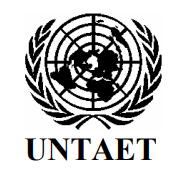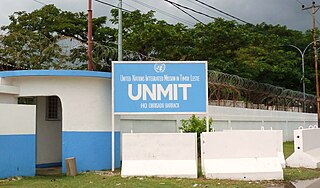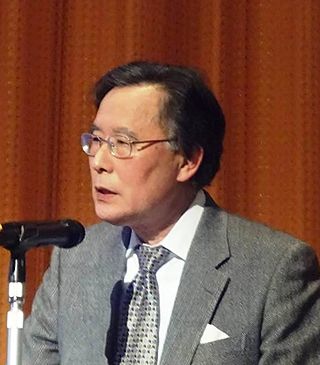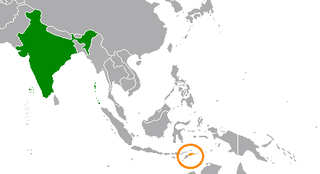
The United Nations Transitional Administration in East Timor (UNTAET),, was a United Nations mission in East Timor that aimed to solve the decades-long East Timorese crisis in the area occupied by Indonesian military. UNTAET provided an interim civil administration and a peacekeeping mission in the territory of East Timor, from its establishment on 25 October 1999, until its independence on 20 May 2002, following the outcome of the East Timor Special Autonomy Referendum. The transitional administration was established by United Nations Security Council Resolution 1272 in 1999.
Since the late 1990s there have been many calls for reforms of the United Nations (UN). However, there is little clarity or consensus about what reform might mean in practice. Both those who want the UN to play a greater role in world affairs and those who want its role confined to humanitarian work or otherwise reduced use the term "UN reform" to refer to their ideas. The range of opinion extends from those who want to eliminate the UN entirely, to those who want to make it into a full-fledged world government. Secretaries-General have presented numerous ways to implement these new reforms. There have been reform efforts since the creation of the UN and closely associated with each of the Secretaries-General.

The United Nations Mission of Support to East Timor (UNMISET) lasted from 20 May 2002 to 20 May 2005, when it was replaced by United Nations Office in Timor Leste (UNOTIL). It was established when East Timor became an internationally recognised independent state and the United Nations Transitional Administration in East Timor (UNTAET) came to an end.

An under-secretary-general of the United Nations (USG) is a senior official within the United Nations System, normally appointed by the General Assembly on the recommendation of the secretary-general for a renewable term of four years. Under-secretary-general is the third highest rank in the United Nations, after the secretary-general and the deputy secretary-general. The rank is held by the heads of different UN entities, certain high officials of the United Nations Secretariat, and high-level envoys. The United Nations regards the rank as equal to that of a cabinet minister of a member state, and under-secretaries-general have diplomatic immunity under the UN Charter.

A United Nations Military Observer (UNMO) is a military official deployed by the United Nations to provide support to a UN mission or peace operation. Described as the "eyes and ears" of the UN Security Council, observers fulfill a variety of roles depending on scope, purpose, and status of the UN mission to which they are attached. A UNMO is generally tasked with monitoring and assessing post-conflict agreements, such as a ceasefire or armistice; the withdrawal of military forces; or the maintenance of a neutral buffer zone. Observers usually undergo special training to ensure neutrality, diplomacy, and deescalation techniques.

The Department of Peace Operations (DPO) is a department of the United Nations charged with the planning, preparation, management, and direction of UN peacekeeping operations. Previously known as the Department of Peacekeeping Operations (DPKO), it was created in 1992 as part of a restructuring of the UN's peace and security apparatus. The DPO retains the core functions and responsibilities of its predecessor, with a greater emphasis on cohesion, integrating different resources and knowledge, and promoting human rights.

The United Nations Integrated Mission in East Timor (UNMIT) was established on 25 August 2006 by UN Security Council Resolution 1704. Its objectives are "to support the Government in consolidating stability, enhancing a culture of democratic governance, and facilitating political dialogue among Timorese stakeholders, in their efforts to bring about a process of national reconciliation and to foster social cohesion". In its most recent resolution on UNMIT, the Council extended its mandate until 26 February 2012. UNMIT and ISF troops left the country at the end of 2012.
Australia was one of the founding members of the United Nations (UN) in 1945 and has been actively engaged in the organisation since its formation. The UN is seen by the Australian Government as a means to influence events which directly affect Australia's interests but over which they have little unilateral control.
Takahisa Kawakami was the United Nations Deputy Special Representative of the Secretary-General for Security Sector Support and Rule of Law, United Nations Integrated Mission in Timor-Leste (UNMIT). He was appointed to this position by United Nations Secretary-General Ban Ki-moon on 2 September 2008.

Ameerah Haq is a Bangladeshi technocrat who served as United Nations Under-Secretary-General for the Department of Field Support, the highest-ranking Bangladeshi official at the United Nations, from April 2012 until her resignation in July 2014. Subsequently, UN Secretary General Ban Ki-moon appointed her as one of the co-chairs of the High-Level Independent Panel on Peace Operations. Haq also served as the Secretary-General's Special Representative for Timor-Leste and Head of the United Nations Integrated Mission in East Timor (UNMIT). Haq joined the UN in 1976.
Luiz Carlos da Costa was an international civil servant working for the United Nations.

United Nations Security Council resolution 1573, adopted unanimously on 16 November 2004, after reaffirming previous resolutions on East Timor (Timor-Leste), particularly resolutions 1410 (2002), 1473 (2003), 1480 (2003) and 1543 (2004), the Council extended the mandate of the United Nations Mission of Support to East Timor (UNMISET) for a final six months until 20 May 2005.

United Nations Security Council resolution 1599, adopted unanimously on 28 April 2005, after reaffirming previous resolutions on East Timor (Timor-Leste), particularly resolutions 1543 (2004) and 1573 (2004), the council established the United Nations Office in Timor-Leste (UNOTIL) to follow on from the United Nations Mission of Support to East Timor (UNMISET) as a special political mission for one year until 20 May 2006.

United Nations Security Council Resolution 1704, adopted unanimously on August 25, 2006, after reaffirming previous resolutions on East Timor (Timor-Leste), particularly resolutions 1599 (2005), 1677 (2006), 1690 (2006) and 1703 (2006), the Council established the United Nations Integrated Mission in East Timor (UNMIT) for an initial period of six months.

The United Nations Mission in South Sudan (UNMISS) is a United Nations peacekeeping mission for South Sudan, which became independent on 9 July 2011. UNMISS was established on 8 July 2011 by United Nations Security Council Resolution 1996 (2011).

United Nations Security Council Resolution 1802 was unanimously adopted on 25 February 2008.

Toby Lanzer, a national of the United Kingdom, is a former assistant secretary-general of the United Nations who recently served as Deputy Special Representative of the Secretary-General in the UN's political office in Afghanistan, UNAMA. Secretary-General António Guterres appointed Lanzer to this position in January 2017, before which he served the United Nations in various peacekeeping, humanitarian and development roles:

Sukehiro Hasegawa is a Japanese academic, educator, author and administrator. He served as the Special Representative of the Secretary-General of the United Nations for Timor-Leste and head of peacekeeping and peacebuilding missions, UNMISET, UNOTIL and UNMIT from May 2004 to September 2006. He is currently the President of the Global Peacebuidling Association of Japan, the ACUNS Liaison Officer in Tokyo, the Chair of the Hiroshima Peacebuilders Center (HPC) Council and the Personal Advisor to former president and Prime Minister José Ramos-Horta of Timor-Leste.

East Timor–India relations are the international relations that exist between East Timor and India. India maintains an embassy in Dili, while East Timor maintains an embassy in New Delhi. India previously announced on 7 September 2023 that it would open its embassy in Dili.

Luís Carrilho is the United Nations Police Adviser since November 2017.












